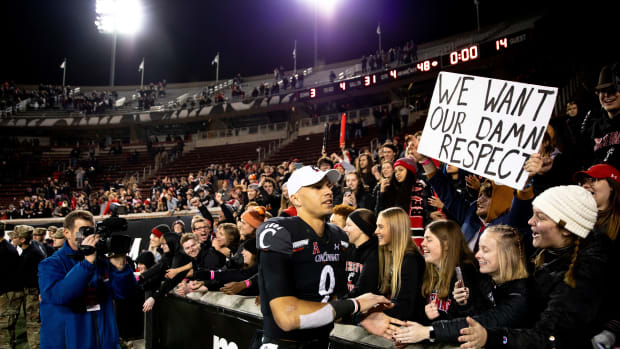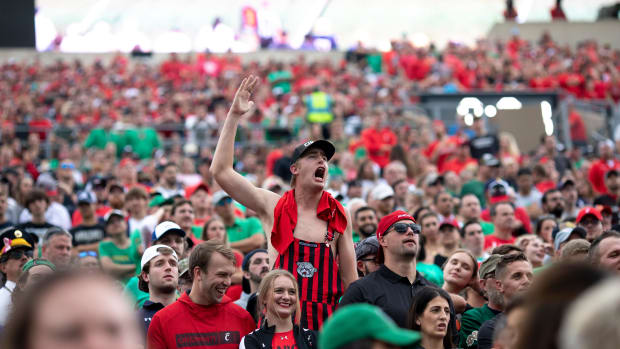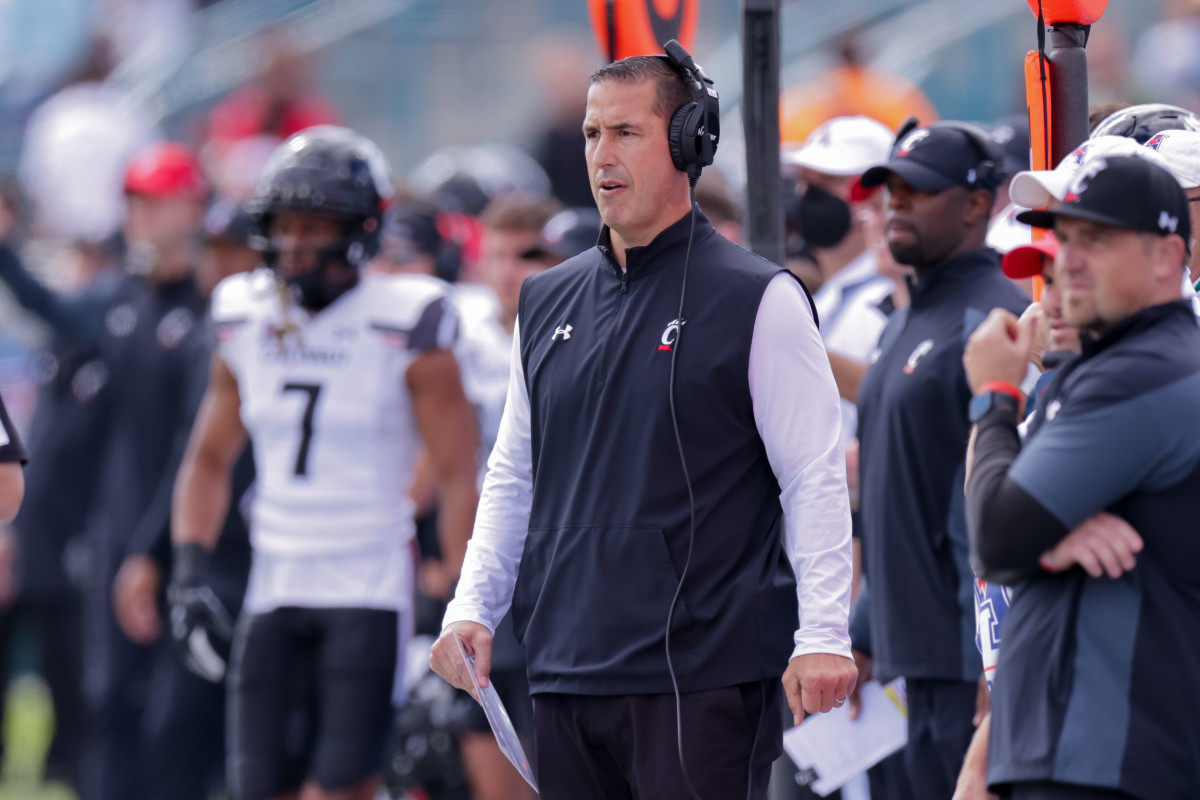For Cincinnati Bearcats, The Football Opportunity of a Lifetime Is Within Reach

CINCINNATI, Ohio -- The sky over Cincinnati in the final minutes of daylight on Friday, Nov. 12, was strangely compelling. A heavy canopy of leaden clouds covered the top of the horizon. A thinner layer hovered closer to the ground. And in between was a ribbon of blue sky, with the sunset slanting through to bathe the hillsides that surround the city in a golden, late-autumn glow.
It didn’t last long. But it was worth savoring.
Driving into town from the Kentucky side of the Ohio River, this tableau vivant was a metaphorically apt visual for the Cincinnati Bearcats, who were about to kick off against South Florida in Tampa. There is a seemingly impenetrable Power 5 conference impediment above Cincinnati in the College Football Playoff rankings, a looming threat below in the form of more Power 5 pursuers, and the fleeting sweet spot between those two ominous layers where the team currently resides.
Inside the Holy Grail downtown, a restaurant right across the street from Great American Ballpark, Drew Young has parked himself at the bar directly in front of one of the many TVs showing the Bearcats game. There are long tables in the main area filled with boisterous Cincinnati fans, but Young is off to the side and in his own world. He isn’t here to chat. He is here to sip a beer and absorb the football.
The game does not begin well for the Bearcats. A lousy USF team scores first. A Cincinnati sack results in a fumble, but a botched attempt at a scoop and score returns possession to the Bulls. That prompts Young to yell at the TV, “F------ fall on the ball!”
It isn’t until the middle of the second quarter that Cincinnati takes the lead. After quarterback Desmond Ridder scores from 13 yards out to make it 14–7, Young takes off his jacket and starts to relax. When they score again four minutes later, Young gets up for the first time, visits the restroom, then orders a second beer. It’s going to be O.K.
Cincinnati would go on to win comfortably, if not impressively. Good enough to stay on the hunt.

“It’s been awesome,” says Young, who is in his early 40s and has two engineering degrees from the school. “I was able to let go of the playoff nonsense early and enjoy each game. I stopped watching the playoff rankings show after the first one. We’ve had a lot of disappointments. Over time you learn there’s stuff you can’t control.”
Twelve days later, the playoff picture is less nonsensical.
After nearly two full seasons of CFP selection committee snubbing, the Bearcats finally were granted access to The Club on Tuesday night. Cincinnati has been undefeated for all nine of the CFP’s rankings last year and this year, but it wasn’t until the ninth of those that it was deemed worthy of a spot in the top four. This is the highest ranking in the eight-year history of the playoff for a Group of 5 conference team, and yet it means nothing if the team stumbles Friday against East Carolina or next week in the American Athletic Conference championship game against Houston.
For now, Southeastern Conference titans Georgia and Alabama remain above the Bearcats. So does in-state behemoth Ohio State—“That crappy school up I-71,” says Young—which owns the state outside Hamilton County and a fair amount of the allegiance within the Cincinnati city limits, too. Behind Cincinnati, a one-loss Big 12 champion (Oklahoma State or Oklahoma) could potentially snatch a bid away. With two rankings to go, it’s tantalizingly close but not yet within its grasp. Things can happen.
Thus far, Young and much of the rest of the Bearcat faithful seem to be staying in this rare golden hour: living in the sunlit present, without skipping ahead to what might happen in December or beyond, to future Big 12 membership; being loud and proud, and trying not to worry about the head coach’s potential job offers or what happens each week in a boardroom in Grapevine, Texas.
“If that message is getting through to the fans, that’s great,” Bearcats coach Luke Fickell told Sports Illustrated. “I don’t get out much, so I don’t know what it’s like out there. But it’s getting through to our team. We just want to stay together.”
In a sport that rewards privilege and protects the powerful, Cincinnati is the common man’s insurgent. An idea spawned on this urban campus in the early 20th century became a guiding principle of the university: cooperative education, the forerunner of internships and other work-study programs, which placed students in jobs while they were still in school to help pay bills and gain real-world experience in their majors. This empowered generations of working-class students to aim for an education that otherwise might have been out of their grasp.
Today, the work-your-way-up concept that engineering dean Herman Schneider conceived in 1906 is embodied in an undefeated football team.
Wilhelmina Klingbiel came to the United States at age 11 from the Frisian Islands off the north coast of Germany in June 1893, sailing into Baltimore on the Darmstadt. Seeking opportunity like millions of other immigrants, her family settled in Port Clinton, Ohio, on Lake Erie between Toledo and Cleveland. While many of the Eastern European men in the area worked in the gypsum mines, Klingbiel opened a flower shop.
Eventually, that shop was taken over by her son, Floyd, and his wife, Mary. They had four daughters, who all worked in the shop growing up. The youngest was Patty. “I can still make a great centerpiece,” she says with a laugh.
When it was time for Patty to go to college, her father recommended the co-op program at Cincinnati. Floyd wanted her to get work experience that would provide a competitive advantage in the job market after college. And coming from a working-class family, it would help pay the bills.
So Patty Klingbiel came to UC in 1986 thinking she would be an engineer but gravitated toward the business school. She worked for five years at Bartlett & Co. during college, an investment firm, and had nine job offers when she graduated. Klingbiel went to work in town at Procter & Gamble before moving to New York and now Chicago, where she is president of The Connell Group, a marketing and brand management company. The co-op program brought Klingbiel to Cincinnati and ultimately wedded her to the university. She has been active in the alumni association since graduation and loves her Bearcats football. And Patty can give a vivid description of what a typical Cincy student is like.
“We have an incredibly strong work ethic, much of which comes from the experiential education program,” Klingbiel says. “We believe we have to work for it, in academics and athletics. That involves a grit and a humility. We always believe in what is possible, and we don’t expect it to be handed to us. All we want is a chance.”
That’s Cincinnati football, and Cincinnati as an academic institution: an urban school with an enrollment of 47,000 that is affordable, accessible and diverse, with a 77% acceptance rate. The engineering, architecture and performing arts schools can attract students nationally, but it’s also a commuter school for many in Hamilton County. The campus is nice and modern but not a leafy enclave isolated from the cityscape that surrounds it.
Nippert Stadium, a tidy sunken bowl that seats 40,000, is its own symbol of the UC spirit. Situated in the heart of campus, students can walk in anytime. When the weather is warm, they’ll study and sunbathe in the bleachers. When it snows, they’ll spell out obscene messages on the field. It is the accessible centerpiece of an accessible school.
And in a world where college, and college football, is increasingly a playground for the rich, Cincinnati is the trend-breaker.

Now the football program—which was a sub-.500 entity from its inception in 1885 through 2005, and where the head coach 28 years ago left of his own volition for the same job at Harvard—serves as a thematically harmonious front porch for the school as a whole. The Bearcats are willing to work for it. All they want is a chance.
Given her marketing and branding expertise, Klingbiel understands the impact this football run has made on the university.
“Nothing wins like winning,” she says. “It’s fascinating how people used to react to UC in latter days versus the present day. When I lived in New York, I literally had to explain to people what the University of Cincinnati was. Now people are bringing up UC to me and asking me what the school is like. I know from my connections at the school that the phone is ringing off the hook in fundraising and the admissions office.
“Winning matters. It’s a heady time for Bearcats.”
Klingbiel holds season tickets and was part of the “Bearcat Express” train trip that took a horde of Cincinnati fans from Chicago to South Bend on Oct. 2 for the biggest game in school history, a 24–13 victory over Notre Dame that stands as the signature win on the team’s playoff résumé. From the hotel party the night before to the train posse that morning to the big tailgate outside Notre Dame Stadium to the tens of thousands of fans whose red-and-black spirit wear stood out amid a sea of Fighting Irish green, it was Cincinnati’s real arrival.
“That was probably, as a Bearcat, the greatest game of all time,” Klingbiel says, then laughs. “To date. So far.”
The wins powered a wave of momentum into November. When ESPN’s College GameDay show came to campus earlier this month, coinciding with the school’s homecoming weekend, it was the program’s biggest moment on campus. The school’s bicentennial celebration in 2019 was a huge undertaking, but it was topped by the contest against Tulsa on Nov. 6.
“I didn’t think we’d ever get more excitement around homecoming than the bicentennial,” says Jennifer Heisey, the school’s chief alumni officer and a second-generation UC alum. “Then we had College GameDay on homecoming and it was the craziest thing. This football team is the gateway to people feeling a sense of pride and a little more connection to their school.”
Among those watching the USF game at the Holy Grail is Brandon Dobbs, too keyed up to sit down. He played soccer at UC, as did his father and twin brother. The family has had season tickets since 1980, when demand was scarce. Even in college, Dobbs had to show only his student ID to get into home games.
“Can we just step back and say, ‘Oh, my gosh, we’re undefeated?’” Dobbs asks. “I think so. It’s pretty special what’s going on. We just keep winning and winning and winning. But, at the same time, we’re so close to the playoff and that adds pressure. We’re supposed to win by 150—style points and all that. It’s frustrating.”
After going 9–0 and being snubbed last year, with a succession of maddening explanations from CFP chair Gary Barta, Cincinnati fans have some lingering issues with the committee. When Cincy did what it seemingly had to do this year—winning all its games, including victories at Indiana and Notre Dame—and still wound up sixth in the first CFP rankings, those frustrations boiled into rage for some. One of the events leading up to homecoming was a sledgehammer car smash of a vehicle that had “CFP” and Barta’s name spray-painted on it.

“I don’t think I’m going out on a limb to say that not all the rules, standards and metrics considered by the committee are applied the same way to the Bearcats,” Klingbiel says, although the elevation of Cincinnati to No. 4 this week has led her to “feel better about Barta than I have the past couple of weeks.”
Cincinnati has at least—and at last—earned the respect of the Big 12 Conference, which added the school along with Central Florida, Houston and BYU for future expansion after losing Texas and Oklahoma to the Southeastern Conference. After years of attempting to find Power 5 entry, this was a side-door entry into a diminished conference, but at least they’re in. We’ll see whether the Big 12 can maintain its standing over the long haul.
The school is determined to do its part. Cincinnati formally announced a $100 million “Day One Ready” fundraising campaign this week, designed to guarantee the program’s long-term competitiveness and provide Fickell what he wants to remain at the school.
Fickell is the next great coaching star in the business, having won 43 of his past 49 games at Cincinnati. If he’d go, USC would gladly take him. Everyone else in the Power 5 with an opening would enthusiastically take a shot, as well. He has already turned down a huge offer from Michigan State in 2019 and has three things that play well in Cincinnati’s favor: deep Midwestern roots that make far-flung locations less desirable, a maniacal focus on this season that would preclude him from early negotiations with any other school and a family focus that accentuates continuity for his six children. If Cincy is willing to make the financial commitment to elite-level football success, there is a good chance Fickell is willing to stay on board. (At least until an Ohio State– or Notre Dame–level job opens.)
The former wrestler has no desire for limelight or acclaim. He is, in many ways, built for Cincinnati. “I think that’s why coach Fickell fits in here,” says Heisey. “What motivates him is what motivates us.”
There has never been a better time to be a Bearcat. How long that continues, no one yet knows. But there is no use worrying about the future or fuming about the past for this striver program. The golden hour is at hand, the clouds have parted and the football opportunity of a lifetime is within reach.
More College Football Coverage:
• Rivalry Week's Most Significant Showdowns
• SI's Top 10: Oregon, Michigan State Crash Out
• Playoff Ranking Reaction: Cincinnati Controls Its Destiny
